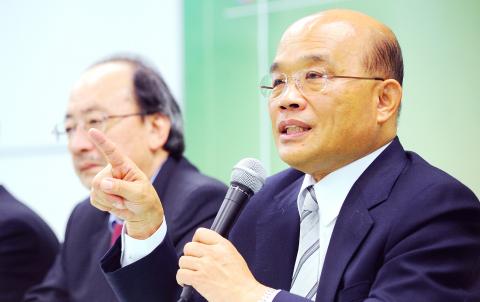The erosion of human rights under President Ma Ying-jeou’s (馬英九) administration, in particular regarding the judiciary and media, has placed Taiwan’s proud democracy in jeopardy and requires attention from the international community, the Democratic Progressive Party (DPP) said yesterday.
“The worsening situation of media development and judicial bias, along with the increasing impact of the ‘China factor,’ have all been serious threats to democracy in Taiwan. We call for the international community’s attention on the ongoing democratic crisis in Taiwan,” DPP Chairman Su Tseng-chang (蘇貞昌) told an international press conference called on Human Rights Day.
Su blasted what he said was Ma’s lack of progress on promoting and protecting human rights during his term, as well as his inaction on what he called the judiciary’s malicious prosecution of former DPP government officials and Beijing’s influence on Taiwan’s media.

Photo: Lin Cheng-kung, Taipei Times
The president’s silence on Tibet’s worsening human rights development and his refusal of the Dalai Lama’s visa were “unwise, incorrect and impolite,” Su said, adding that his party supports Tibetans’ calls for democracy and religious freedom.
Ma has not only sat and watched Beijing’s behind-the-scene maneuvering, he has been personally involved in the monopolization and control of Taiwan’s media, former Public Television Service general manager Sylvia Feng (馮賢賢) said.
Feng accused Ma of applying a three-part strategy to monopolize local media by first “paralyzing the public television system and controlling the Chinese Television System,” then following up with Want Want China Times Group’s (旺旺中時集團) “vertical integration of a cable television service and horizontal integration of its pending merger of the Next Media Group.”
Feng said Ma turned a deaf ear when renowned US-based historian Yu Ying-shih (余英時) of Academia Sinica categorically voiced his concerns about increasing Chinese influence on Taiwan’s media.
On the judicial front, other than the system’s relentless and malicious prosecutions of DPP politicians, most of which were later dropped, the president has failed to honor his promise to amend domestic laws that do not comply with a pair of international human rights covenants that his administration ratified in 2009, lawyer Kao Yung-cheng (高涌誠) told the press conference,
Ma has only paid lip service to the covenants because the 54 regulations listed by the Ma administration as incompatible with the covenants have not been amended three years after his administration ratified them, Kao said.
Implementing the Assembly and Parade Act (集會遊行法) was the most glaring example of Ma’s noncompliance with the covenants, Kao said.
Summing up Ma’s presidency over the past five years, DPP caucus convener Ker Chien-ming (柯建銘) said there were two major crises in Taiwan: first, people’s suffering from the sluggish economy; second, the backsliding of human rights and the re-emergence of authoritarianism.
The DPP legislative caucus also expressed concern about the human rights situation at a press conference held in the Legislative Yuan yesterday.
DPP Legislator Tsai Chi-chang (蔡其昌) said it was imperative for Ma to “roll up his sleeves and do whatever he needs to do on a wide range of human rights issues” because the government will not improve human rights simply by ratifying international covenants.

SECURITY: As China is ‘reshaping’ Hong Kong’s population, Taiwan must raise the eligibility threshold for applications from Hong Kongers, Chiu Chui-cheng said When Hong Kong and Macau citizens apply for residency in Taiwan, it would be under a new category that includes a “national security observation period,” Mainland Affairs Council (MAC) Minister Chiu Chui-cheng (邱垂正) said yesterday. President William Lai (賴清德) on March 13 announced 17 strategies to counter China’s aggression toward Taiwan, including incorporating national security considerations into the review process for residency applications from Hong Kong and Macau citizens. The situation in Hong Kong is constantly changing, Chiu said to media yesterday on the sidelines of the Taipei Technology Run hosted by the Taipei Neihu Technology Park Development Association. With

CARROT AND STICK: While unrelenting in its military threats, China attracted nearly 40,000 Taiwanese to over 400 business events last year Nearly 40,000 Taiwanese last year joined industry events in China, such as conferences and trade fairs, supported by the Chinese government, a study showed yesterday, as Beijing ramps up a charm offensive toward Taipei alongside military pressure. China has long taken a carrot-and-stick approach to Taiwan, threatening it with the prospect of military action while reaching out to those it believes are amenable to Beijing’s point of view. Taiwanese security officials are wary of what they see as Beijing’s influence campaigns to sway public opinion after Taipei and Beijing gradually resumed travel links halted by the COVID-19 pandemic, but the scale of

A US Marine Corps regiment equipped with Naval Strike Missiles (NSM) is set to participate in the upcoming Balikatan 25 exercise in the Luzon Strait, marking the system’s first-ever deployment in the Philippines. US and Philippine officials have separately confirmed that the Navy Marine Expeditionary Ship Interdiction System (NMESIS) — the mobile launch platform for the Naval Strike Missile — would take part in the joint exercise. The missiles are being deployed to “a strategic first island chain chokepoint” in the waters between Taiwan proper and the Philippines, US-based Naval News reported. “The Luzon Strait and Bashi Channel represent a critical access

Pope Francis is be laid to rest on Saturday after lying in state for three days in St Peter’s Basilica, where the faithful are expected to flock to pay their respects to history’s first Latin American pontiff. The cardinals met yesterday in the Vatican’s synod hall to chart the next steps before a conclave begins to choose Francis’ successor, as condolences poured in from around the world. According to current norms, the conclave must begin between May 5 and 10. The cardinals set the funeral for Saturday at 10am in St Peter’s Square, to be celebrated by the dean of the College